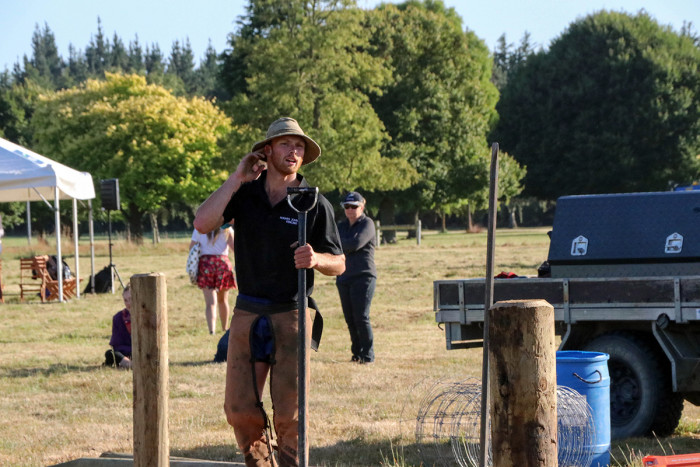Fencer
Kaihanga Taiapa
Alternative titles for this job
Fencers construct and repair fences, barriers or walls made of timber, metal, wire, chain-link or other materials.
Pay
Fencers usually earn
$24-$30 per hour
Fencing contractors usually earn
$45-$62 per hour
Source: Fencing Contractors Assn, 2019.
Job opportunities
Pay
Pay for fencers varies depending on skills and experience.
- Entry-level fencers usually start on the minimum wage.
- Skilled fencers usually earn between minimum wage and $30 an hour.
- Fencing contractors can earn between $45 and $62 an hour.
Source: Fencing Contractors Association, 2019.
- PAYE.net.nz website – use this calculator to convert pay and salary information
- Employment New Zealand website – information about minimum wage rates
(This information is a guide only. Find out more about the sources of our pay information)
What you will do
Fencers may do some or all of the following:
- repair or demolish and remove existing fences and obstacles
- lay out fence lines, dig fence post holes and position posts
- mix and pour concrete and set posts accurately
- construct fences, barriers or walls made of timber, metal, wire, chain-link or other materials
- assemble gates and hang them in position
- use different types of machinery and power tools
- estimate job requirements and quote prices for customers
- operate their own business as a fencing contractor.
One of the best things about this job is that it's always changing. One day I might be driving posts in with a tractor, the next I'll be wiring or doing other fencing work.

Henry Watson
Fencing contractor
Skills and knowledge
Fencers need to have knowledge of:
- fencing materials, designs and styles
- costing methods and business management
- how to use power tools and machinery
- technical plans and how to follow instructions and procedures
- carpentry and how to make concrete.
Working conditions
Fencers:
- often work irregular and long hours
- work in all but the most extreme weather conditions
- often work in dusty or muddy conditions
- may travel to private properties, or industrial and commercial sites, and may work in remote rural areas.
What's the job really like?

Henry Watson
Fencing contractor
Good opportunities for fencing contractors
Henry Watson started his fencing contracting company Three Rivers Fencing in 2018. Since then, he has built the business up and now works across Canterbury and Methven.
“We specialise in all kinds of agricultural fencing. I also do residential fencing which requires different materials, and a different approach.”
From employee to business owner
After working for a local fencer, Henry became interested in owning his own contracting business.
He loves the flexibility of working for himself and the opportunities it provides. “Self-employment offers me the chance to grow my business in my own way.”
Advice about a career in fencing
If you are considering a career as a fencing contractor, Henry’s advice is to get out there and get some experience. He suggests it would be an advantage to have completed a course or two, and earned a qualification before entering the industry.
Henry says there are good opportunities and rewards if you’re prepared to work hard and learn from your experience.
“Firstly, pick the right guy to work for – don't just go and work for anyone. Pick a contractor that works to a very high standard and you'll gain valuable experience going forward.”
Entry requirements
There are no specific requirements to become a fencer as you gain skills on the job. However, some employers prefer to hire fencers who have or are working towards a New Zealand Certificate in Fencing, or a New Zealand Certificate in Agriculture (Level 2) which has a fencing component.
New Zealand Certificates in Agriculture are overseen by the Primary Industry Training Organisation (Primary ITO) and involve theory and on-the-job training.
New Zealand Certificates in Fencing are offered at Levels 2, 3 and 4 by training providers throughout the country.
Most employers also require you to have a full driver’s licence.
Secondary education
No specific secondary education is required for this job, but construction and mechanical technologies, maths and physical education to at least NCEA Level 2 are useful.
Year 11 and 12 learners can find out more about the construction industry, and gain relevant skills, by doing a New Zealand Certificate in Building, Construction and Allied Trades (Level 1 and 2) through the BConstructive programme.
For Year 11 to 13 learners, trades academies and the STAR and Gateway programmes are good ways to gain relevant experience and skills.
Personal requirements
Fencers need to be:
- able to follow instructions
- fit and healthy
- able to solve problems and make decisions
- well organised and safety-conscious
- good communicators.
Useful experience
Useful experience for fencers includes:
- concreting or trenching work
- building and construction work
- landscaping
- farming
- working with hand and power tools.
Physical requirements
Fencers need to have:
- a good level of fitness and must be strong as they lift heavy building materials
- good hand-eye co-ordination as they need to use power and hand tools
- good eyesight (with or without corrective lenses) as they need to measure and align fences accurately.
Find out more about training
- Primary Industry Training Organisation
- 0800 208020 - info@primaryito.ac.nz - www.primaryito.ac.nz
What are the chances of getting a job?
Rural and residential fencers in demand
Demand for rural fencers is good due to ongoing maintenance requirements, farm ownership changes and redevelopment.
Opportunities are also good for residential and commercial fencers, due to increased housing needs and land development.
According to the Census, 2382 fencers worked in New Zealand in 2018.
Increase your chances of finding fencing work
You can increase your chances of finding fencing work if you have:
- physical ability and a positive attitude
- labouring experience with a fencing contractor
- practical skills and hands-on experience gained through farming, construction or landscaping.
Most fencers work for contractors
Most fencers are employed by fencing contractors, whose clients may include:
- farmers and orchard growers
- lifestyle block and rural property owners
- residential and commercial customers
- building and construction firms.
Sources
- Alice, S, 'Opportunities in Fencing for Those Willing to Work', 12 January 2020, (www.nzherald.co.nz).
- Edmunds, S, 'Fencing Businesses Struggle for Staff: "Young People Don't Want to do Physical Work",' 29 January 2019, (www.stuff.co.nz).
- Stats NZ, '2018 Census Data', 2018.
- Weir, M, board member and business development manager, Fencing Contractors Association NZ, careers.govt.nz interview, September 2019.
(This information is a guide only. Find out more about the sources of our job opportunities information)
Progression and specialisations
Fencers may progress to set up their own contracting business, or move into management roles.
Fencers often specialise in either rural or residential and commercial fencing, or a particular type of fencing such as:
- barrier fencing such as retaining walls or garden fences
- farm or orchard fencing
- security fencing
- masonry fencing using materials like brick, concrete or stone
- metal or wrought-iron fencing
- pool or deck fencing.
Last updated 27 March 2025

